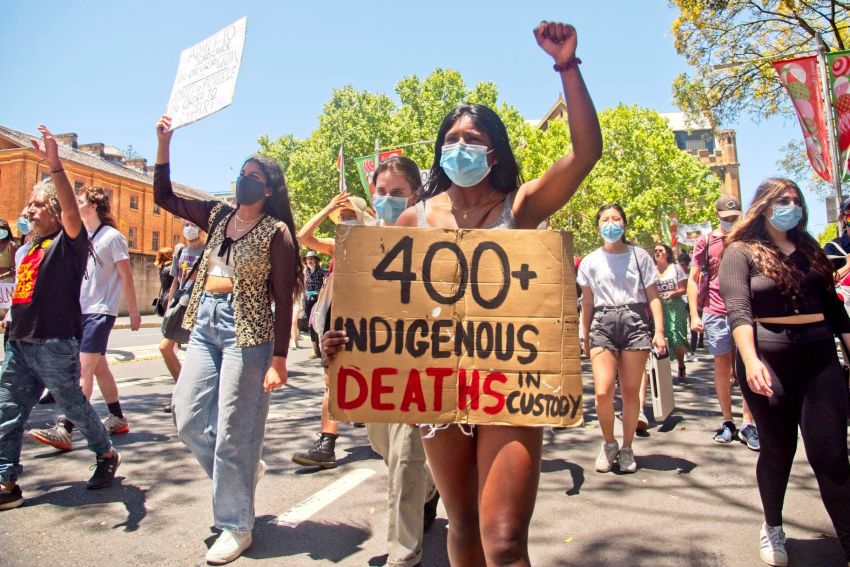
Two First Nations people lost their lives in custody over three days in New South Wales.
A 26-year-old man died in Shortland Correctional Centre in Cessnock on November 7.
Two days later, NSW police shot dead 46-year-old Gomeroi man Stanley Russell inside his aunt’s house in north-west Sydney.
His devastated parents, Ted and Helen Russell, told The Guardian: “It is terribly painful for us to learn suddenly that we will never see Stanley’s smile again. His children will suffer from never seeing him again.”
Stanley was their last surviving son. Their other son, Edward, died in prison custody in 1999.
“There are many questions about the killing of our son Stanley by police that we will seek to have answered through the coronial inquest.
“We will keep going in our struggle for justice, to ensure that deaths in custody must stop.”
Then on December 1, a 30-year-old First Nations woman died in Melbourne's Sunshine Hospital after being transferred there from Dame Phyllis Frost Centre, a maximum security women's prison in Deer Park.
Their deaths took the number of First Nations people who have died in custody since the 1991 Royal Commission into Aboriginal Deaths in Custody to 485.
‘Frustratingly slow process’
Aboriginal Legal Service (NSW/ACT) told Green Left on November 30 that there have been, “10 deaths in custody nationwide since May 1”. The figure is now 11 with the latest death in Melbourne.
ALS acting CEO Nadine Miles said: “Every death in custody is a tragedy. The Aboriginal Legal Service sends our deepest condolences to the families and communities who have lost loved ones this way.
“Whenever an Aboriginal person dies in custody or a police operation, authorities notify us and we reach out to the family to offer our support.”
ALS is currently working with 17 Aboriginal families who had a member died in prison or as a result of a police operation.
“Families are often put through a frustratingly slow process to get answers after a death in custody," Miles said.
“All deaths in prisons and police incidents are subject to a coronial inquiry, but a shortfall in funding and resources for the coronial system means there are long delays between when someone dies and when their family is able to get answers.”
ALS has called for funding to be increased to the Coroner’s Court to cut long delays between deaths and inquests.
“Just in the past fortnight, the inquest into the death of Danny Whitton concluded — more than six years after his death in custody,” Miles said. “The Coroner’s Court needs to provide prompt inquests that are culturally appropriate and therapeutic for families"
“The government should be held accountable when people die under state care. This means being transparent with the public when a death in custody has occurred, while respecting the wishes of families as to whether names and personal information should be disclosed.
“Government and agencies must also be accountable for following coronial recommendations, and this is something we’ve called for today in our appearance before the parliamentary inquiry into the Coroner’s Court.”
Enabling injustice
In many instances, inquests have "enabled injustice". The royal commission found inquests “merely reflected the inadequacies of perfunctory police investigations and did little more than formalise the conclusions of police investigators."
The police investigate all deaths in their custody and hold the power to act on behalf of the coronial inquiry.
Coroners are not allowed to suggest civil or criminal liability and are forced to rely heavily on police investigations for evidence.
In many instances, family statements have been disregarded or not considered as evidence.
The Law Enforcement Conduct Commission (LECC), an independent statutory body, started operating in July 2017.
Despite this independent watchdog operating outside of law enforcement and corrections, Corrective Services NSW and NSW Police continue to conduct and investigate their own.
This is a huge issue facing First Nations communities.
ALS has called for a completely independent, stand alone body to investigate deaths in custody.
Failing system
There is also very little financial help for First Nations families who lose loved ones in custody.
Technically, Corrective Services can provide a subsidy for funeral expenses, but there is currently no discretionary fund set up to help victim’s families when there is a “critical incident” involving police, like in the shooting of Stanley Russell.
The NSW Legislative Council released its inquiry report into First Nations custodial deaths and over incarceration in April.
Its recommendations included raising the age of criminal responsibility from 10 to 14, addressing the growing number of women being incarcerated, changes to ensure more people receive bail and enhanced measures to divert youths from the criminal justice system.
First Nations people in Australia are the most incarcerated people on Earth. They make up 2% of the population, but experience a much higher rate of incarceration than the non-Indigenous population. First Nations women, for example, represent 34% of the total number of inmates.
[A snap protest has been called by the family of the Melbourne woman for outside State Library on December 3, 1pm to call for an end to Black deaths in custody.]